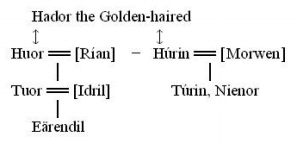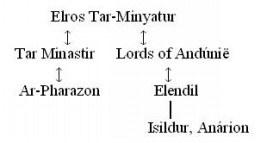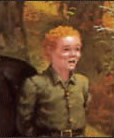c. Men
– the Secondborn Children of Ilúvatar; awoke in the east of Middle-earth after the war between the Elves and Morgoth started; some Men chose to serve Morgoth, others (the Three Houses of the Edain) became friends and allies to Elves. The term Edain (singular Adan) [‘eh-dine, ‘ah-dahn] (Atani in Quenya) is used both for the Three Houses and for uncorrupted Men in general.
Men of Beleriand
– includes mainly the Three Houses of Men (Edain) that were the first to arrive in Beleriand, and the only ones to become elf-friends. They were the House of Bëor, House of Hador, and House of Haleth.
Other Men who later came to Beleriand are some of the Drúedain* who were few and don’t play any part in The Silmarillion, and Easterlings, who came last, and mainly because they were promised the lands of the other Men by Morgoth if they fought for him.
HOUSE OF BËOR
– the first clan of Men to come into Beleriand; found by Finrod Felagund whose kin they became allies of; lived in the wooded lands of Dorthonion, the realm of Finrod’s brothers Angrod and Aegnor; their land was destroyed in the Battle of Sudden Flame.

Bëor the Old [‘beh-or] – the first known chieftain of his House; led his people into Beleriand where they were found, befriended and educated by Finrod Felagund, King of the Elven realm of Nargothrond; Bëor later left the rule over his people to his son and spent the rest of his life in Nargothrond among Elves.
Barahir [‘bah-rah-hear] – father of Beren; renowned for saving the life of the Elven king Finrod Felagund in battle; received Finrod’s ring in return as token of his debt (see Ring of Barahir); slain in the aftermath of the battle.
You know him from: Aragorn mentions him and his death in the story of Lúthien that he tells on Weathertop (FotR)

You know him from: Aragorn tells his tale on Weathertop (FotR); Sam mentions the tale of his quest for the Silmaril on the way to Mordor (TTT) and a mention is made of his great physical strength in Sam’s fight with Shelob (TTT).
HOUSE OF HADOR
– the most warlike and numerous of the Houses of Men, and also the fairest (many of them are golden-haired) and most connected to Elven histories; lived in the land of Dor-Lómin in the northern realm of Fingolfin the High King of the Noldor; faithful allies of Fingolfin; their land was destroyed after the Battle of Unnumbered Tears and Easterlings took residence there.
You know them from: in TTT, Faramir says it’s believed in Gondor that the Rohirrim are descended from the House of Hador.

Hador the Goldenhaired [‘hah-dor] – an ally and friend to Fingolfin, the High King of the Noldor; lived in Fingolfin’s realm; killed in the Battle of Sudden Flame.

Also called: Húrin the Steadfast (for his defiance to Morgoth)
You know him from: Named one of the greatest elf-friends by Elrond at the Council (FotR)


Also called: Mormegil (“Black Sword” after his sword), Gorthol (“dread helm” after his helm), Neithan (“The Wronged” after his departure from Doriath), and other names.
You know him from: Named one of the greatest elf-friends by Elrond at the Council (FotR); his great physical strength is mentioned in Sam’s fight with Shelob (“[Shelob’s skin] could not be pierced [by any weapon even should] the hand of Beren or of Túrin wield it.“) (TTT)

Also called: Níniel („Tear-maiden“) – the name under which she was known after losing her memory and wandering among the people of the forest of Brethil.
Huor [‘hoo-or] – brother of Húrin and uncle of Túrin and Nienor; father of Tuor; valiant warrior; slain in the Battle of Unnumbered Tears while his brother Húrin was taken captive.

HOUSE OF HALETH (THE HALADIN OF BRETHIL)
– the second clan of Men to come into Beleriand; their best known chieftain is the woman Haleth; they are fond of freedom, solitude and roaming in the forests; their best known residence is the forest of Brethil west of the realm of Doriath, where they lived along with the Drúedain whose nature was similar to theirs.* They appear mainly in the story of Túrin Turambar.

Brandir [‘brahn-deer] – the last known leader of the wood people of Brethil; killed by Túrin whom his people followed after he came among them.
Men of Númenor
– descendants of the three Houses of Elf-friends from the First Age; distinguished from the lesser Men of Middle-earth by their long lives (ranging from 500 years for the first king, to about 200 for the last ones), great powers and knowledge. Outstanding warriors, mariners and voyagers. Their creations in Middle-earth are unsurpassed by any of the later Men. Initially revered the Valar and were friendly with Elves, but later became corrupted by their fear of death, pride, greed and envy of those who live in Valinor.
Also called: Dúnedain (singular Dúnadan) [‘doo-neh-dine, doo-nah-dahn] – “Men of the West“
You know them from: they’re often mentioned in LotR.
Relationships with Elves and lesser Men: INITIALLY – were friendly with Elves: received gifts such as the palantíri and the White Tree from the Elves of Valinor, and aided the Elves of Middle-earth in their struggle against Sauron. Taught Men of Middle-earth masonry, farming and other skills, and were worshipped by them. LATER – became estranged from Elves whom they envied, and only came to Middle-earth for their own profit (collect taxes, wood etc.)
They eventually separated into two followings-
– the King’s Men (majority of Númenoreans; those who were corrupted; followed the King; later followed also Sauron and worshipped Morgoth)
– the Faithful, or Elendili (“elf friends”) (minority; followers of the Lords of Andúnië; revered the Valar and Ilúvatar; in days of Sauron’s influence pursued; only they survived the destruction of Númenor under the lead of Elendil and his sons; cherished the gifts they got from the Elves and brought them to Middle-earth)
Among their works built in Middle-earth are: Orthanc, Argonath, Minas Tirith, Minas Ithil (later M.Morgul), the Watchtower of Weathertop, and others.
Among the objects they brought to Middle-earth are: the palantíri, the White Tree, the Ring of Barahir, Narsil, the Sceptre of Annúminas and the Stone of Erech.

KINGS
– Númenor was ruled by 22 kings and 3 ruling queens. The names of the later corrupted Kings are Adûnaic (the language of Númenor); the previous ones are Elvish.

Tar-Minastir [‘tar mih-‘nas-tihr] – the king whose fleet utterly defeated Sauron’s armies in the war between Sauron and Elves of Middle-earth shortly after the One Ring was forged and Hollin destroyed.*
Ar-Pharazôn the Golden [‘ahr ‘phah-rah-zawn] – the last King of Númenor and the most corrupted; childless; desired to be King of all Men; took Sauron captive and brought him to Númenor, but fell under his influence; convinced by Sauron to worship Morgoth, pursue elf-friends, destroy the White Tree and make war on Valinor. Destroyed along with his army shortly after arriving in Valinor.
LORDS OF ANDÚNIË
– lords of the westernmost region of Númenor; they and their followers became the Faithful or Elf-friends when the other Númenoreans became corrupted; they’re descended from Elros the first King; they and their followers were saved from the destruction of Númenor in their ships, and permanently settled in Middle-earth. The most famous of the Lords of Andúnië is the last one, Elendil the Tall.

You know him from: he’s mentioned in LotR multiple times; Aragorn calls himself Elendil’s heir; the Middle-earth history of Elendil and his sons is discussed at the Council. (FotR)
Isildur [ih-‘sihl-doohr] – son of Elendil; survived the destruction of Númenor; along with his brother Anárion ruled over Gondor after arriving in Middle-earth; rescued a seedling of the White Tree in Númenor and planted it in Middle-earth; killed by Orcs in the battle of Gladden Fields shortly after the War of the Last Alliance; his line continued in the North.
Anárion [ah-‘naa-ree-on] – brother of Isildur and son of Elendil; ruled over Gondor along with Isildur; killed during the Siege of the Dark Tower in the War of the Last Alliance; his line continued in Gondor until succeeded by Stewards.
You know them from: they’re both mentioned in LotR multiple times; the likenesses of Isildur and Anárion were depicted in the statues of the Argonath; Denethor calls himself a Steward of the House of Anárion and Aragorn repeatedly calls himself Isildur’s heir.
<!… tarcolan edited 22.3.15 correcting img tags, improving headings









